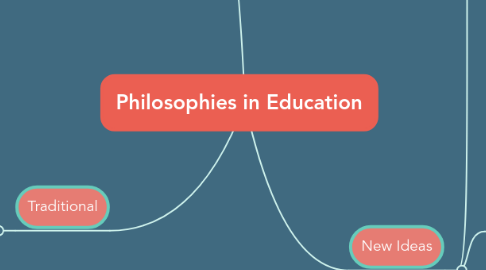
1. Christian philosophy - the quilt of philosophies that Christians choose for themselves.
2. Traditional
2.1. Knowledge and book experience
2.1.1. Perennialism - a return to absolutes. Human nature is consistent, so everyone should be taught the same.
2.1.2. Idealism-all about knowledge, since teachers know the most, they are the center of the classroom.
2.1.3. Essentialism - preparing students to be members of civilized society, effort is more important than interest and what better way to exert effort than by rote memorization.
2.2. Hands on experience
2.2.1. Realism-all truth is observable, natural order is important. An old idea that values experiments.
2.3. Other!
2.3.1. Analytic philosophy - knowledge is based on objective science. You need to clarify your language, and your thoughts will be understood.
3. New Ideas
3.1. Knowledge and books experience
3.1.1. Neo Scholasticism - prove existing truths through rational process and reason.
3.2. Hands on experience
3.2.1. Humanism - Catering lessons to what students want. Creating a safe and open environment that students feel comfortable in.
3.2.2. Pragmatism - Nothing is absolute, truth is what works! Knowledge is in experience.
3.2.3. Post-moderism - schools function as change agents. Progress is stressed over content.
3.2.4. Progressivism - Student is the focal point, teachers and students learn together. All about engaging students in meaningful ways.
3.2.5. Reconstructionism - correcting social problems in the world. Be an active change in the world. Schools should be actively teaching social change.
3.3. Other!
3.3.1. Existentialism - there are no absolutes, everyone determines their own morals and truths.

